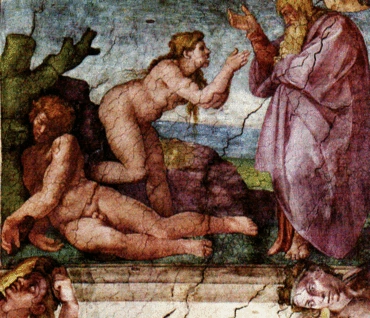1
Послј сего Адамъ позналъ Еву жену свою; и она зачала и родила Каина, и сказала: приобрјла я человјка отъ Іеговы.
2
Потомъ родила брата его Авеля. Авель былъ пастырь овецъ; а Каинъ былъ земледјлецъ.
3
Спустя нјсколько времени Каинъ принесъ отъ плодовъ земли даръ Іеговј.
4
И Авель также принесъ отъ первородныхъ овецъ своихъ и отъ тука ихъ. И призрјлъ Іегова на Авеля и на даръ его.
5
А на Каина и на даръ его не призрјлъ: и Каинъ сильно огорчился и потупилъ взоры свои.
6
Тогда Іегова сказалъ Каину: для чего ты огорчился? и для чего потупилъ взоры твои?
7
Если дјлаешь доброе: то не поднимаешь ли чела? а если не дјлаешь добраго: то у дверей грјхъ лежитъ; онъ влечетъ тебя къ себј, но ты господствуй надъ нимъ.
8
И говорилъ Каинъ съ Авелемъ братомъ своимъ; и когда они были въ полј, Каинъ возсталъ на Авеля брата своего, и убилъ его.
9
И сказалъ Іегова Каину: гдј Авель братъ твой? онъ сказалъ: не знаю; развј я сторожъ брату моему?
10
Но Богъ сказалъ: что ты сдјлалъ? гласъ крови брата твоего вопіетъ ко мнј отъ земли.
11
И нынј проклятъ ты отъ земли, которая отверзла уста свои принять кровь брата твоего отъ руки твоей.
12
Когда будешь воздјлывать землю, она не ставетъ болје давать силы своей для тебя; ты будешь изгнанникомъ, и станешь скитаться по землј.
13
И сказалъ Каинъ Іеговј: велико преступленіе мое и непростительно.
14
Вотъ, Ты теперь сгоняешь меня съ лица земли, и отъ лица Твоего я скроюсь, и буду изгнанникомъ и стану скитаться по землј; всякой, кто встрјтится со мною, убьетъ меня.
15
И сказалъ ему Іегова: за то всякому, кто убьетъ Каина, отмстится всемеро. И положилъ Іегова на Каинј знаменіе, что бы кто, встрјтясь съ нимъ, неубилъ его.
16
И пошелъ Каинъ отъ лица Іегова; и сталъ жить въ землј Нодъ, на востокъ отъ Едема.
17
И позналъ Каинъ жену свою, и она зачала, и родила Еноха. И построилъ городъ; и наименовалъ городъ по имени сына своего Енохомъ.
18
Отъ Еноха родился Ирадъ, отъ Ирада родился Мехіаель; отъ Мехіаела родился Меѕушаелъ; отъ Меѕушаела родился Ламехъ.
19
Ламехъ взялъ за себя двј жены: имя одной Ада, имя другой Цилла.
20
Ада родила Іавала: сей былъ отецъ живущихъ въ шатрахъ со стадами.
21
Имя брату его: Іувалъ, сей былъ отецъ всјхъ играющихъ па гусляхъ и органј.
22
Цилла также родила Ѕовела кузнеца, сей былъ отецъ кующихъ, всјхъ работающихъ изъ мјди и желјза. У Ѕовела кузнеца была сестра Ноема.
23
И сказалъ Ламехъ женамъ своимъ: Ада и Цилла! послушайте словъ моихъ: Жены Ламеховы! вслушайтесь въ рјчь мою: Я убью человјка, Который поранитъ меня, И отрока, Который ударитъ меня.
24
Если за Каина должно быть отмщено всемеро; То за Ламеха въ семьдесятъ разъ всемеро.
25
И еще Адамъ позналъ жену свою, и она родила сына, и нарекла ему имя: Сиѕъ; потому что, говорила она, Богъ положилъ мнј другое сјмя вмјсто Авеля, котораго убилъ Каинъ.
26
У Сиѕа также родился сынъ, и онъ нарекъ ему имя Эносъ; тогда начали называться по имени Іеговы.







